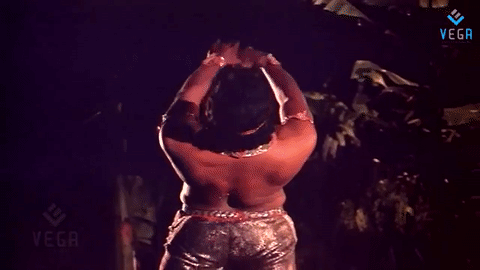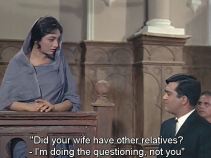Aaj Ka Goonda Raj is a Hindi remake of Chiranjeevi’s Telugu blockbuster, Gang Leader. The dishoom sound effects are quite subdued by Telugu standards but Chiru’s hair is even bigger than a regulation police hat and he goes all out in the action and dances.
Raja (Chiranjeevi) is an unemployed specimen and lives with his grandmother (Dina Pathak), brothers Ravi (Raj Babbar) and Amar (Parikshit Sahni), and Amar’s wife (Sudha). He dreams of being Robin Hood, but is more likely to get into a scuffle with the police on the way to the disco than righting any larger scale wrongs.
Admire his awesome moves, even as you may recoil at the sweat flicking and floor humping. Plus bonus Ravi Teja!
Raja takes a job to evict a squatter – Shalu (Meenakshi Sheshadri). She turns up at his house spinning a sob story, looking to move in. His family turn on him of course and take Shalu’s side, or at least feel they need to protect a poor defenceless girl all alone in the world blah blah blah.
Raja agrees to go to jail over a car accident to protect the driver, a father trying to marry his daughter off. Or something. He gets paid for the time served and the cash helps Golden Boy Ravi take the exams for whatever he wants to be. The father (Satish Shah) is actually the jailer. Oh so filmi. Raja is treated well while he is a jailbird. Except that they let Shalu in to see him as she says she is his wife so I think they failed in their duty of care towards him, although I admire her persistence and the power of her imagination. Who says Mass films are simplistic? I get conflicted all over the place.
Reluctant hero and pushy heroine can be very amusing or not at all, and this is a bit too slapstick for my taste. But once Shalu stops just obsessing about Raja she gets a lot more interesting and Meenakshi seems more comfortable in the role. She and Chiru have nice chemistry and Meenakshi certainly gives him a run for his money in the songs and in the drama.
Raja can’t win as he is criticised for not working and then berated when he does. His family love him but despair of him ever getting his life sorted out. He occasionally impersonates his deceased grandfather who ostensibly appears to ask Grandma to go easy on the boy. It’s all silly but the family are there for each other when it counts.
Amar sees something he shouldn’t and villain Tejpal (Prem Chopra) has him eliminated. Tejpal’s pet police officer Saxena (Dalip Tahil) has been trying to get Raja out of the way for most of the film, and finally marries his sister Ritu (Geetha) to Ravi. She is tasked with tearing the brothers asunder, but sorely underestimates the power of filmi bro-dom and the effect on her own psyche of being around decent human beings.
Finally Tejpal and his weirdo sidekick (a very creepy Sharat Saxena) stage a fatal accident using Raja’s taxi, and his friends. Raja goes to trial and is devastated to see what happened to his poor harmless mates.
Raja escapes, thanks to Shalu driving the getaway car and looking striking in huge puffy yellow sleeves. She tells him her sad story of how Tejpal killed her mother and then she shoots Raja’s handcuffs off. Most of Raja’s family are useful in a fight and Shalu gets in there, boots and all too. No one waits for Raja when they can do something for themselves, so the final confrontation is epic and random and had me cheering them all on. I do love a needlessly complex plan and the film obliges.
Apart from the murdering aspect (because it is wrong, even when Chiru is doing it), I liked that Raja simply stepped back and let Shalu deal with Tejpal. He didn’t take her revenge from her or make his own need for justice more important than hers. And anyway, he had Saxena so there was plenty of vengeance to go round.
Despite all the death and mayhem, it’s quite a cheerful and upbeat film for the most part. The songs are not as good as Gang Leader but they are filmed well and I can never be unhappy with Chiru dancing on giant props.
Side note: This wall decoration is in several Telugu films and now turns up here. Was it a common item in that day, or did some poor set dresser lug it around from house to house?
This was Chiranjeevi’s second Hindi film. It is hardly a stretch for Chiru but might have been a bit confronting for the mainstream Hindi film audiences of the day. I mean, he can actually dance. Mithun would have been spewing to have his moves put to shame so easily. And the action is energetic and athletic and a bit brutal although there is less fake blood than I recall in the original. It’s a good vehicle for him as it retains the mass flavour of the original and his heroics need no tweaking to be transplanted to Bombay. Sadly, I don’t think Bollywood was ready for this jelly. And that is their loss, as there was a golden opportunity for less of this:
And more of this:
See this for a ripping yarn of family and revenge, Chiranjeevi at possibly peak mullet, and Meenakshi as a feisty heroine. Then go watch Gang Leader! 3 ½ stars!






























































